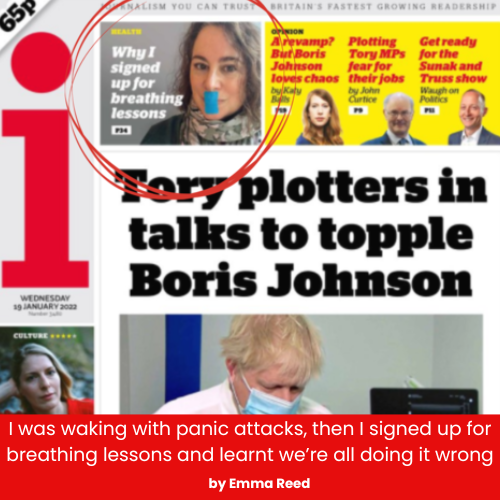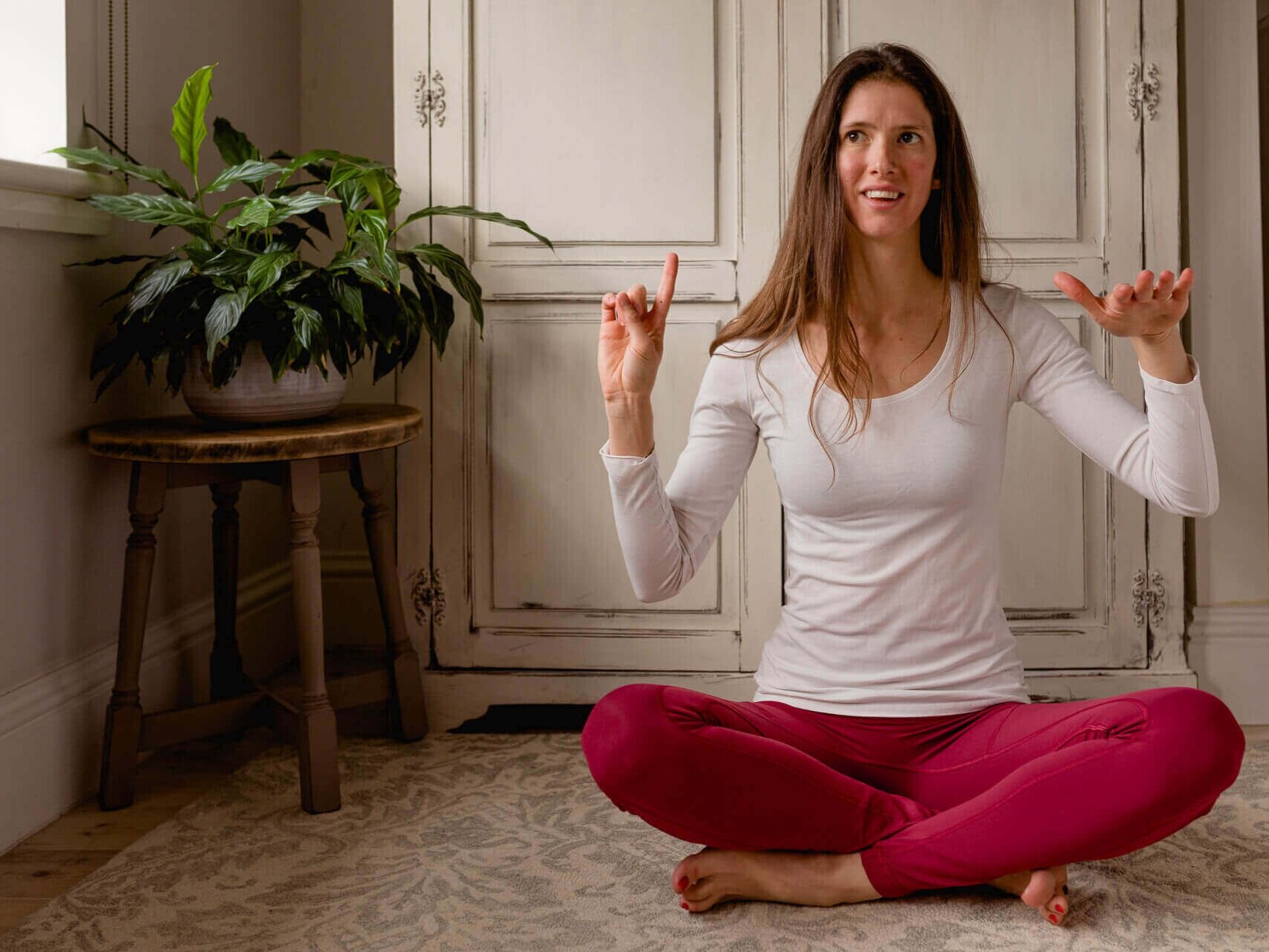
Improve Anxiety in Perimenopause
How can I manage perimenopausal symptoms including anxiety and panic attacks naturally?
Do you feel like you’re losing control of your body and mind?
First of all, understand that you are not alone.
Increased anxiety in perimenopause is a common experience, which can feel like you’ve had a rug swept from underneath you.
If you’re one of the 75 - 80% of women who experience perimenopause anxiety symptoms, the severity, type and effects can differ dramatically, making it really tricky to know how to best manage them.
We are totally unprepared for this period of our life, and this is the time to change that.
On the perimenopause journey…
You are likely starting or part way through a journey of considering HRT and/or working on lifestyle factors like nutrition, movement and sleep.
A crucial area to look at though is ‘how you are breathing’, not only during heightened anxiety but all of the time.
The reality is that your breathing habits have likely been deteriorating for some time, without you realising. Now your hormones have tipped you over the edge. You might also be experiencing more extreme symptoms of breathlessness and panic attacks.
You add the deteriorated breathing habits to confusion and panic, and you have the perfect storm.
How I am going to help you with perimenopausal anxiety:
We will work on improving your level of anxiety through breathing retraining.
You will gain a toolkit to better manage anxiety spikes and hot flushes as well as panic attacks and breathlessness. We manage this with increased awareness and breathwork hacks, making you feel empowered as you take back control of your nervous system. With time, you will be able to reduce the intensity and preventatively support yourself. We work together on your self compassion too.
If you think back, it is likely you’ve been experiencing an increase for years, for example pre-menstrually when your breathing rate and heart rate naturally increase. Now it is just off the chart and you feel completely unprepared.
How to take control with the next step:
Book a 55 minute breathing assessment and consultation call with me. This is via Zoom. (If however you live near Bicester, Oxfordshire, we can meet in person too.)
You will take away incredible breathing habit insight, alongside some crucial hints and tips. If you’d then like to work with me, we can discuss how I can best support you. I have different options for different budgets and needs (e.g. if you are also a snorer - yes breathing habits impact that too).
Typical client feedback
“Had such fun working with you. THANK You!”, says Jess
“You’ve changed my life!“, says Elizabeth
Let’s get a handle on that anxiety (and the fear of it) shall we?
Improving our breathing can have multiple benefits. Most people feel calmer, sleep better and are better prepared to stop a hot flush from escalating into sweats.
Hi, I’m Jane Tarrant, Breathing Habit Retrainer, Educator, Author and TEDx Speaker
Are you ready to:
jointly assess your breathing habits
learn about healthy breathing habits
think about the next steps of tackling anxiety through breathing retraining?
Why do breathing habits deteriorate for perimenopausal women?
There are a number of reasons for the deterioration of breathing habits. We can look at tongue position, airway development (impacted by how you breathed as a child), posture, movement, awareness, lifestyle habits, restriction, perception, anxiety, stress, congestion, allergens, and many more.
The reality is, your breathing habits have likely been deteriorating for decades.
It is just that now, they are causing you an issue you are unable to ignore.
Let’s get you supported!
Here are some examples of how perimenopausal women feel before working with me
Mind map of lived experiences of how anxiety can present in perimenopause.
1. Panic Attacks: “I’d had a normal day, just read a bedtime story to the kids and gone downstairs to watch TV. Next minute, a terrifying wave of existential dread hits me, I’m cold, clammy, lying on the floor feeling faint with a heart rate of 144, unable to catch my breath.”
2. Poor Sleep: “I’ve never really struggled with sleep issues but wow, when I started waking multiples times, often at 3am, feeling anxious, with a racing heart, I really started to question my sanity and it left me feeling exhausted.”
3. Palpitations: “I’d just be sat, relaxed, completely into a series on Netflix and BAM, out of nowhere, the palpitations would hit in my throat and my heart would be racing like I was running from an imaginary threat.”
4. Brain Fog: “I’ve started to find that I can’t remember where I’ve just put something. I’ve never had to write lists before and always had a great memory, so it’s scary to feel like I am literally losing my mind.”
5. Reduced Libido: “What with the anxiety, lack of sleep and bodily changes, I just didn’t feel in the mood. I hardly had the energy to look after the kids and the house, intimacy was the last thing on my mind, but I felt so guilty.”
6. Lack of support: “You feel so alone, like no one you know is going through this. You’re embarrassed to confide in people incase they think you’re crazy. I’ve been dismissed by doctors as too young and am wary of HRT anyway. I lack the tools and support to feel empowered.”
7. Self Perception: “I literally felt like I lost my identity after my first panic attack. I’d been cool headed and competent, now I was feeling completely out of control of my body, my mind and I second guessed myself all of the time.”
8. Stress Sensitivity: “I mean in my thirties I had run a university department and managed a £2 million budget without a problem, so why was I now completely stressed and overwhelmed doing the weekly shop in my forties?!”
Where you might have come across Jane Tarrant
My mission is to lead global education on healthy breathing habits & breathing retraining, in a simple, accessible way.
Key benefits of breathing retraining & breathwork for perimenopause
Feel Healthier
Our breathing habits underpin everything that we do. Through our breath, we can positively impact our nervous system, recovery, sleep quality, digestion, performance, pain management and so much more.
Feel Empowered
We often don’t realise what tools are within our control. By understanding yourself and your breathing better, you can adapt how you perform, respond and feel. Wouldn’t you like to know how to utilise these tools?
Feel Safe
Our bodies react to stressors all day long. You can use breathing awareness to notice when your body does not feel safe and consciously control your breathing until you notice a positive calming change.
P.S. If you have got this far, but are still left with questions before booking a call, email me on jane@canidoitmyself.com (and don’t forget to tell me how you found me).







